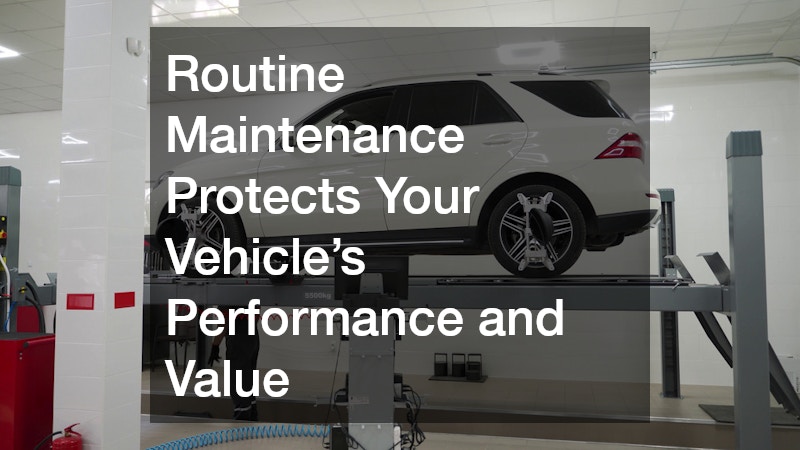Owning a vehicle is a significant investment—one that demands consistent care to ensure lasting value, safety, and performance. Many drivers underestimate the long-term impact of routine check-ups, inspections, and minor fixes, often delaying essential services until a major problem arises. However, regular auto maintenance services are not just precautionary; they are vital for preserving the health and efficiency of your car.
From oil changes and tire rotations to fluid inspections and brake checks, these seemingly minor tasks can prevent expensive repairs and extend the life of your vehicle. In this article, we’ll explore why prioritizing regular maintenance is one of the smartest decisions a vehicle owner can make.
You’ll learn how maintenance boosts performance, prevents major damage, enhances resale value, and ultimately supports your car’s longevity.
How Does Regular Maintenance Improve Vehicle Performance?
Importance of Engine Oil Changes
Regular oil changes are pivotal for reducing engine friction, ensuring smooth operation, and maximizing efficiency. Engine oil acts as a vital lubricant, allowing the myriad internal components to function seamlessly without unnecessary wear.
Failure to change oil regularly can lead to sludge formation, which significantly increases the risk of engine failure. Keeping up with oil changes not only minimizes these risks but can also improve gas mileage, saving fuel costs over time.
Statistically, vehicles that undergo regular oil changes are less likely to experience critical engine breakdowns, thus contributing to overall vehicle longevity. This routine service also contributes to maintaining optimal engine temperature, preventing overheating.
Role of Tire Maintenance
Tire care is another critical component of vehicle maintenance, primarily impacting traction and driving safety. Properly maintaining tire pressure and health ensures optimal contact with the road, providing better control and handling.
Under-inflated tires can reduce gas mileage, increasing fuel consumption and affecting the vehicle’s performance. Regular tire rotation and balance checks not only prolong tire life but also maintain the integrity of suspension components.
Ensuring the tires’ proper alignment helps distribute vehicle weight evenly, reducing wear and tear. This preventive measure is integral in avoiding uneven tread wear, which can lead to unexpected blowouts.
What Are the Long-Term Benefits of Scheduled Check-Ups?
Prolonging Vehicle Lifespan
Scheduled check-ups play a crucial role in extending a vehicle’s lifespan by diagnosing potential issues early. These check-ups involve inspecting critical components like brakes, belts, and fluids, ensuring everything is in optimal working condition.
Addressing small issues before they escalate can prevent major mechanical failures. For instance, a simple coolant refill can prevent overheating, sparing significant engine repairs.
Statistics show that vehicles receiving regular maintenance are less likely to need premature replacement. This continued care helps in maintaining the vehicle’s functionality across its intended lifespan, benefiting the owner substantially over time.
Enhancing Resale Value
In the resale market, a well-maintained vehicle generally commands a higher price and attracts more potential buyers. Buyers are typically willing to invest in a vehicle that will not require immediate repairs, appreciating its maintained condition.
Consistent maintenance records serve as proof of the vehicle’s care, enhancing trust with potential buyers. These records demonstrate that the vehicle has been kept in optimal condition, providing peace of mind about its reliability.
Ultimately, investing in regular maintenance can yield financial returns when selling the vehicle. A car with full maintenance records is seen as a more secure and appealing investment, reducing the risk of post-purchase issues.
Can Regular Maintenance Prevent Major Repair Costs?
Identifying Early Warning Signs
Routine maintenance allows for the early identification of potential issues, serving as a protective measure against unforeseen repair costs. Mechanics can spot warning signs during inspections that an untrained eye might miss.
Early detection of issues such as brake wear or exhaust problems can prevent extensive damage. This proactive approach helps to mitigate the risk of larger, more expensive repairs by resolving minor faults early.
Adopting a regular maintenance schedule significantly reduces the likelihood of breakdowns. This foresight saves both time and financial resources, providing a more predictable cost of ownership.
Cost-Effective Parts Replacement
Regularly replacing worn-out parts can prevent severe vehicle problems, offering cost-effective protection against breakdowns. Parts like belts, filters, and spark plugs tend to wear over time, and timely replacement can avert bigger failures.
Replacing components as necessary can prevent chain reactions that lead to more complex repairs. For example, a worn belt could affect the functioning of the alternator, eventually leading to power issues.
Preventive maintenance strategies, such as routine part replacements, ensure that the vehicle remains in peak condition. This approach minimizes downtime and enhances the overall reliability of the vehicle.
Routine auto maintenance services are more than just a checklist—they’re a proactive strategy to safeguard your vehicle’s performance, reliability, and value. By committing to regular oil changes, tire care, system check-ups, and timely parts replacement, you’re investing in peace of mind and long-term savings.
Avoiding maintenance might save time in the short term, but the long-term costs—financial and mechanical—can be steep. With a trusted maintenance routine, drivers can enjoy smoother rides, fewer breakdowns, and a longer-lasting vehicle. Make maintenance a habit, not an afterthought, and your car will reward you with years of dependable service on the road.




